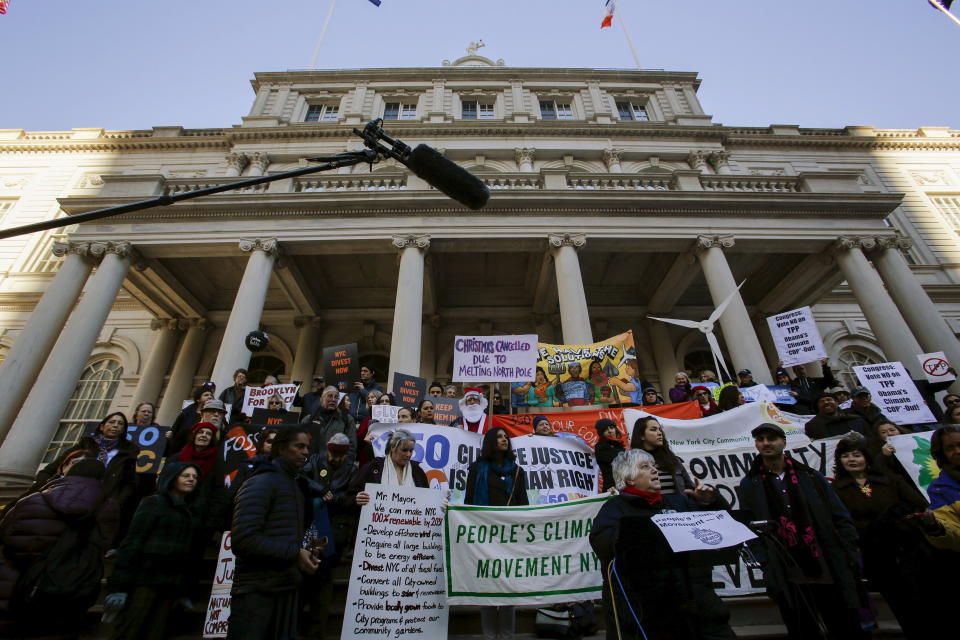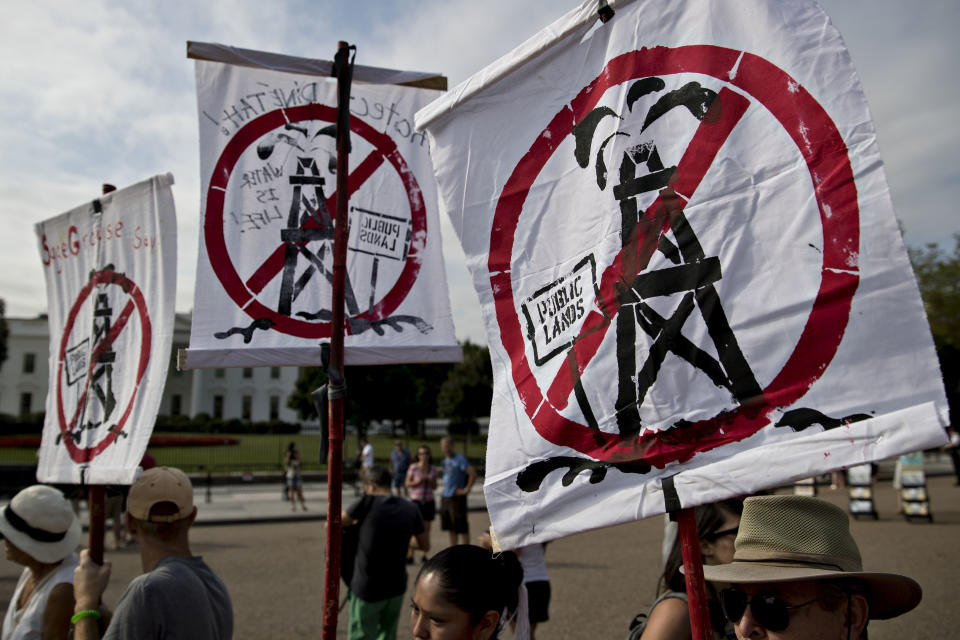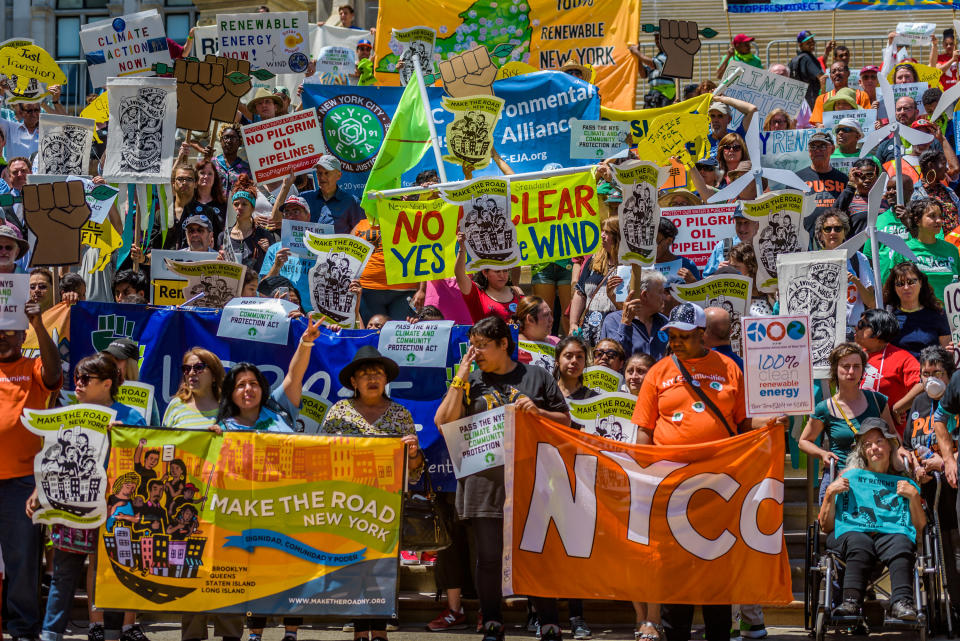Christian Conservative: Jesus Wouldn't Want Me To Care About Global Warming

What would Jesus do about climate change? According to one self-described Christian, not much.
Conservative pundit Erick Erickson fired off a tweet Wednesday saying his savior called on him to be a good steward for the planet... but that concept doesn’t extend to global warming:
I worship Jesus, not Mother Earth. He calls us all to be good stewards of the planet, but doesn't mean I have to care about global warming.
— Erick Erickson (@EWErickson) May 31, 2017
The tweet drew a sharp response from many, including other Christians, and no small amount of bemusement from Erickson, who suggested people read the replies to get “your laugh for the night.”
Here’s a sampling:
Well it's gunna really suck for Jesus when he returns and most of the planet is under water.
— Paolo Gregoletto (@TriviumPaolo) May 31, 2017
If you think Jesus cares more about oil profiteering than protecting the earth you are reading the wrong book, my dude.
— Molly Knight (@molly_knight) May 31, 2017
I worship Jesus, not the poor. He calls us all to feed the hungry, but that doesn't mean I have to care about starving people.
— Laura Robinson (@LauraRbnsn) May 31, 2017
Even Jesus is saying, "Jesus Christ!" while trying to figure out how stupid this statement is.
— Dennis Perkins (@DennisPerkins5) May 31, 2017
"Say what now?" pic.twitter.com/frKuoOVR3G
— Wristoph Waltz (@LoneDangerous) May 31, 2017
HAHAHAHAHAHAHAHAHA. Oh shit...you're serious.
— Kris M. Wernowsky (@kriswernowsky) May 31, 2017
I took a night to think about how to actually respond to you and here it is. I am asking St. Francis to pray for you.
— Audrey Assad (@audreyassad) June 1, 2017
That’s like saying you love your pets but you’re not concerned about feeding them.
— Zak McIntyre (@zakmcintyre) May 31, 2017
— Simon Curtis (@simoncurtis) May 31, 2017
"You're doing it wrong."
-Jesus— Kim (@mimimama516) May 31, 2017
As a Christian I can say that this is without a doubt the most ludicrous statement to come down in a while. https://t.co/Nz43LRsWpU
— Maury Brown (@BizballMaury) May 31, 2017
Climate change as a reality is affirmed by every Christian body from the Vatican to the protestant and orthodox World Council of Churches.
— Rev.Dr. Chuck Currie (@RevChuckCurrie) May 31, 2017
Can you explain to me how being "good stewards of the planet" excludes caring about global warming?
— Alexandra Cheney (@alexandracheney) May 31, 2017
— T (@Mindovermagik) May 31, 2017
This is what is called cognitive dissonance. The irony is lost on @EWErickson. https://t.co/8Rq5hTw9Bz
— SpinDoctor (@SpinDr) June 1, 2017
"He calls us all to be good stewards of the planet, but doesn't mean I have to care about global warming." Uh, that's exactly what it means.
— Christian Delante (@DelanteMedia) May 31, 2017
In other words God calls you to take care of the Earth but that doesn't mean you have to do it. Gotcha.
— Bill Cullen (@oracle_head) May 31, 2017
Jesus would want you to save the Earth. He liked to give back.
— Sean O'Leary (@stholeary) May 31, 2017
I didn't think there was a "but" after anything Jesus said but wtf do I know I'm just a person who reads.
— White Whineocide🍫🥛 (@scarlito82) June 1, 2017
Sounds like Erick is having his own covfefe moment 😂🤣😂.
— Harbor Hound8 (@harborhound8) May 31, 2017
Also on HuffPost
Strengthen city, county and state climate efforts

“The ominous signals coming out of D.C. point to even more work needed at the city and state level,” said Kate Kiely, national media deputy director at the Natural Resources Defense Council. In November, the NRDC announced partnerships with 20 cities across the country from St. Paul, Minnesota, to Houston, Texas, to make strides in renewable energy.
According to Brune, cities could have an especially big influence in the climate change fight. “We should be pushing cities to go 100 percent clean energy and to reject natural gas and coal and other fossil fuels,” he said. “A majority of people now live in cities, so this could have a dramatic impact.”
In the U.S., at least 20 cities have made commitments to rely completely on clean energy.
“People should organize and get their own cities to move forward,” Brune said.
Contact your mayor, city council, or county or state representative and get them to set a timeline to stop using fossil fuels.
Push companies and institutions to divest from fossil fuels

As of December, more than 640 institutions worldwide, including several universities, churches and for-profit companies and banks, have pledged to divest from their fossil fuel investments. According to Go Fossil Free, a 350.org campaign, the commitments amount to more than $3.4 trillion.
Consumers should petition companies to ditch their fossil fuel investments, and students should urge their schools and colleges to do the same.
“As we wrap up the hottest year in history, we know that investments in the fossil fuel industry fund these climate impacts. That’s why it’s more critical than ever that we push our institutions to divest from the fossil fuel companies that are knowingly perpetuating the climate crisis,” Lindsay Meiman, U.S. communications coordinator for 350.org, told HuffPost.
Want to push a company, school or place of worship to divest from fossil fuels? 350.org has a list of resources to help you start a campaign. Or find an existing one to get involved in.
Put your money where your mouth is

“Your ATM card or checking account or your mortgage, these should not be financed by companies that are taking your checking fees or other payments to subsidize the Dakota Access Pipeline or finance drilling offshore. Make sure your money aligns with your values,” Brune said.
In September, Amalgamated Bank became the first North American bank to commit to divest 100 percent from fossil fuels. Aspiration has bank accounts that are fossil fuel-free, and Beneficial State Bank has credit cards that don’t invest in fossil fuels.
Anthony Hobley, CEO of the Carbon Tracker Initiative, said consumers should also ensure that their pensions, 401(k) or other retirement savings accounts are similarly not underwriting fossil fuel companies.
“A lot of pressure can be made through the financial industry,” Hobley said from London. “Ordinary people who hold pensions can put pressure on companies through their pensions. Put pressure on the people who manage your money and that’s one way to keep pressure on those companies too.”
The financial services companies that manage retirement accounts “aren’t used to getting many letters from the people whose money they manage,” Hobley added. “It wouldn’t take much of an organized effort for them to take notice.”
Are your investments supporting fossil fuels? FossilFreeFunds.org is a web tool that allows people to check whether their individual investments or employer-provided 401(k) is supporting coal companies, oil and gas producers, and fossil-fired utilities.
Making a "financial case" for clean energy

With new clean energy technologies getting more efficient and cheaper than fossil fuels, a transition to renewables is “inevitable,” said Hobley. It’s just a matter of time.
“Trump can no more stop this transition than a previous U.S. president could’ve stopped the transition from steam locomotives to the automobile or the typewriter to the computer. The technological genie is already out of the bag,” he said. “It’s not a case of ‘if,’ but ‘when.’ But the ‘when’ is important because of the 2 degrees budget, and that’s where a lack of political leadership or resistance can have a real impact.”
Clear political leadership from both the U.S. and China could mean a "smoother" and faster transition to clean energy. A lack thereof, however, could “make it easier for big oil and gas companies to stay in denial” — and that “would be to their detriment,” Hobley said. “It would mean pouring more money, billions or trillions of dollars, into fossil fuel assets that we simply don’t need.”
Trump now has the opportunity to make the United States a leader in clean energy.
“These are complicated and highly technical products,” Hobley said. “With an educated and skilled workforce, these are the kinds of things that should be manufactured in the U.S.”
Creating new jobs was a central part of Trump’s election platform. Maybe someone should remind him that the clean energy industry creates more jobs per unit of energy than coal and natural gas. In 2015, the number of U.S. jobs in solar energy overtook those in oil and natural gas extraction for the very first time.
A 2015 report by NextGen Climate America found that a transition to clean energy would add a million jobs by 2030 and up to 2 million jobs by 2050, while increasing the nation's gross domestic product by $290 billion and boosting household income.
We should be citing such figures and urging utility companies and public utility commissions to embrace clean energy. (Public utility commissions regularly hold hearings that are open to the public. Attend them, and voice your thoughts!)
Speak out!

“Talk to your friends and family, and make sure your representatives are making good decisions,” Aliya Haq, deputy director of NRDC’s Clean Power Plan Initiative, wrote in a blog post. “The main reason elected officials do anything difficult is because their constituents make them.”
In the coming months and years, “there will be mass mobilizations that folks should join to push back against Trump’s regressive policies and hateful rhetoric,” said 350.org’s Meiman. “Folks can engage online by joining online actions, signing petitions and contributing their voice on social media to push back on Trump’s agenda.”
You can also participate in protests in your area or join and support local nonprofits in their fight against climate change.
Reduce your own carbon footprint

“Building heating and cooling are among the biggest uses of energy,” said NRDC’s Haq. Make your home more energy-efficient by sealing drafts and ensuring your home is adequately insulated and ventilated too.
Also consider changing your diet. “Cut down on meat consumption or even eliminate it from your diet completely,” Brune said. “I do think that people can have a powerful impact on the environment just by eating less meat.”
It takes 14 times as much biologically productive land to produce 1 ton of beef as it takes to produce 1 ton of grain, according to the Global Footprint Network.
Global livestock is also responsible for 14.5 percent of all anthropogenic carbon emissions, data from the United Nations' Food and Agriculture Organization shows.
Driving a fuel-efficient vehicle is another way to reduce your carbon footprint. You can also take steps to be more fuel efficient when you're on the road, no matter what car you drive.
Support environmental journalism

Over the next four years, Trump needs to be held accountable, and the press must make climate change a central issue in his presidency.
The Society of Environmental Journalists, a nonprofit membership organization supporting environmental journalists in the U.S. and around the world, aims to “improve the quality, accuracy and visibility of reporting on the environment.” You can also support nonprofit environmental news outlets such as Inside Climate, Grist and High Country News.
Love HuffPost? Become a founding member of HuffPost Plus today.
This article originally appeared on HuffPost.

